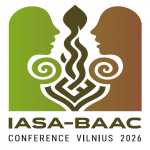Digital Archives, Audiovisual Media and Cultural Memory
Digital Archives, Audiovisual Media and Cultural Memory
Conference, The University of Copenhagen, November 14-15, 2013
Keynote speakers:
David Hendy, University of Sussex
Karin Bijsterveld, Maastricht University
Lev Manovich, City University of New York
Michele Hilmes, University of Wisconsin-Madison
Digitization enables us to meet cultural heritage artifacts and narratives in heretofore unimagined media and platforms. Accessibility to written, visual, auditory and audiovisual sources increase dramatically. But how do we wish to access and interact with cultural heritage sources in the 21st Century? This conference focuses on practices of cultural memory in the multiform meetings between users and cultural heritage. What interfaces are established between users, be they researchers or ‘ordinary’ citizens, and the archives of cultural heritage? What possibilities are opened for interaction with cultural heritage artifacts? And what methods and scientific paradigms are relevant to order and describe such immense archives.
One aspect, which seems to have received too little treatment so far, is the question of the auditory and audiovisually based cultural heritage’s role in the construction of historical narratives. Music, film, radio, and television have become ingrained in a nation’s cultural memory, and in many, not least, European countries, state-governed national broadcasting corporations have played and do still play a vital role in narrating and interpreting the past, not least by establishing institutional production archives which give producers access to historical material otherwise inaccessible. Such reuses of historical materials afford renegotiations of the historical past(s) by valuating the new historical materials as significant historical sources. Digitization means that such historical materials, be they broadcast or other cultural heritage artifacts, are to an increasing degree accessible outside the production environment, e.g. for research. One recurring problem is that the materials are still under the editorial control of the parent institution and accessible only for some uses to some users. This motivates a new look at the question of who has the right to circulate archived material in what forms, and thus who is allowed to narrate the past. The question is relevant at all levels, from the level of national cultural politics all the way down to the concrete definition of rights for individual users in the archive or on broadcaster’s websites.
The conference wishes to contribute new perspectives to these issues, first, by focusing on (access to) digital media archives, a phenomenon that has only really come into existence over the last decades, and secondly, by focusing on auditory and audiovisual source material, i.e. data sources with an extension in time, as oppose to texts and pictures. Again, digital archives of auditory and audiovisual material are rather young compared to archives of (scanned) texts and pictures. Finally, the conference’s focus is on the digital archives’ role in the construction of cultural history as well as studies in cultural history and cultural memory. Traditionally, digital humanities have tended to focus on the internal structure of artifacts, e.g. using digital texts to investigate language systems, translations, stylistics etc.
The conference welcomes contributions from a broad range of researchers, designers and developers who work with digital archives of auditory and audiovisual media in the investigation or production of cultural history phenomena. All of these definitions shall be taken in their widest sense. A digital archive can range from enormous national archives to the archives collected by individual researchers and research groups. Similarly, the conference wishes to invite both concrete experience with collecting and using digital archives as well as theoretical reflections on the nature of digital archives. Likewise, the concepts of cultural history and cultural memory shall be taken in their broadest sense and can include both historical investigations and research within the broader humanities with either an historical or an aesthetic scope.
Papers
We welcome papers relating to the general outline of the above call. The conference will embrace three sub themes: Interface (i.e. the construction, design and interface of the archive), Immensity (dealing with the vast amounts of data which all of a sudden are available to research that has heretofore tended to work qualitatively with rather small samples), Memory (choosing from the archives, sampling and building a coherent interpretation). Please indicate if your paper addresses one or two of the themes in particular.
Panels
Along with open and themed paper sessions, we have accepted a number of themed panels to take place at the conference. A themed panel will consist of a minimum of 3 papers with a common research question. If you whish your paper to be taken under consideration for a particular panel, please select the panel as “category” in the Easy Chair submission form. Submissions not accepted for panels will be taken into consideration for the open paper sessions.
The practices of exhibiting sound, organized by Christian Hviid Mortensen & Morten Søndergaard
Infrastructural Sustainability and Curatorial Practices of the Digital Archive, organized by Luca Antoniazzi
How to make radio and sound archives work for audiences? Organized by Zillah Watson
Who keeps the memory? Organized by Teo Mäusli, Brecht Declercq & Petra van Dijk
Challenging the homogeneity of ’media language’, organized by Jacob Thøgersen
My Childhood Radios, organized by Henrik Reeh
Transnational Radio Encounters, organized by Golo Föllmer & Jacob Kreutzfeldt
Radio and Music/Music Radio, organized by Morten Michelsen


